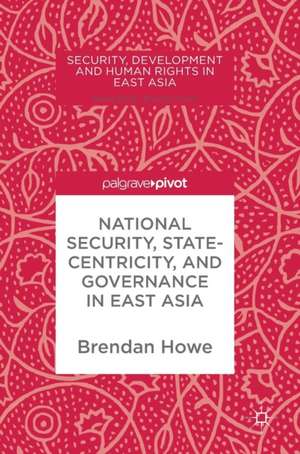National Security, Statecentricity, and Governance in East Asia: Security, Development and Human Rights in East Asia
Editat de Brendan Hoween Limba Engleză Hardback – 24 oct 2017
| Toate formatele și edițiile | Preț | Express |
|---|---|---|
| Paperback (1) | 412.68 lei 43-57 zile | |
| Springer International Publishing – 23 aug 2018 | 412.68 lei 43-57 zile | |
| Hardback (1) | 418.83 lei 43-57 zile | |
| Springer International Publishing – 24 oct 2017 | 418.83 lei 43-57 zile |
Preț: 418.83 lei
Nou
Puncte Express: 628
Preț estimativ în valută:
80.14€ • 83.89$ • 66.70£
80.14€ • 83.89$ • 66.70£
Carte tipărită la comandă
Livrare economică 31 martie-14 aprilie
Preluare comenzi: 021 569.72.76
Specificații
ISBN-13: 9783319589732
ISBN-10: 3319589733
Pagini: 199
Ilustrații: X, 160 p. 1 illus.
Dimensiuni: 148 x 210 mm
Greutate: 0.36 kg
Ediția:1st ed. 2018
Editura: Springer International Publishing
Colecția Palgrave Macmillan
Seria Security, Development and Human Rights in East Asia
Locul publicării:Cham, Switzerland
ISBN-10: 3319589733
Pagini: 199
Ilustrații: X, 160 p. 1 illus.
Dimensiuni: 148 x 210 mm
Greutate: 0.36 kg
Ediția:1st ed. 2018
Editura: Springer International Publishing
Colecția Palgrave Macmillan
Seria Security, Development and Human Rights in East Asia
Locul publicării:Cham, Switzerland
Cuprins
1. State-Centric Challenges to Human-Centered Governance .- 2. The New Kimism in Sŏn’gun Korea: The Third Generation of the Kim Dynasty .- 3. In the Land of Democratic Rollback: Military Authoritarianism and Monarchical Primacy in Thailand .- 4. Governance and Human Insecurity in Myanmar .- 5. The Politics of Survival in Cambodia: National Security for Undemocratic Control .- 6. Neo-Authoritarian Peace in Timor-Leste .- 7. More Growth, Less Freedom? Charting Development Pathways in Lao PDR .- 8. Conclusion.
Notă biografică
Brendan Howe is Professor and Associate Dean at the Graduate School of International Studies, Ewha Womans University, South Korea. Major recent works include Democratic Governance in Northeast Asia (2015) and Post-Conflict Development in East Asia (2014).
Textul de pe ultima copertă
“The edited book is innovative in its approach and seeks to bridge the gap between a conceptual model (securitization of governance) and area studies (six Asian countries). It represents a high-quality piece of research that will have an impact on the existing literature.”
—Ralf Emmers, Professor of International Relations, Nanyang Technological University, Singapore
This book assesses the extent to which an emphasis on national security and prioritization of state interests has dominated governance policy-making in Northeast and Southeast Asia, at the expense of human security, human development, and human rights. The findings are that in many cases, there are embedded structural obstacles to achieving human-centered governance objectives in the region. These relate to the role of the military, historical authoritarian legacies, and new authoritarian trends. Contributors examine not only the most obvious instances of military domination of governance in the region (North Korea with its “Military First” philosophy, Thailand since the 2014 coup, and Myanmar with its long history of military rule), but also less well known examples of the influence of conflict legacies upon governance in Cambodia, Timor-Leste, and Laos, as well as the emergence of new reservoirs of power and resources for the forces of authoritarianism.
—Ralf Emmers, Professor of International Relations, Nanyang Technological University, Singapore
This book assesses the extent to which an emphasis on national security and prioritization of state interests has dominated governance policy-making in Northeast and Southeast Asia, at the expense of human security, human development, and human rights. The findings are that in many cases, there are embedded structural obstacles to achieving human-centered governance objectives in the region. These relate to the role of the military, historical authoritarian legacies, and new authoritarian trends. Contributors examine not only the most obvious instances of military domination of governance in the region (North Korea with its “Military First” philosophy, Thailand since the 2014 coup, and Myanmar with its long history of military rule), but also less well known examples of the influence of conflict legacies upon governance in Cambodia, Timor-Leste, and Laos, as well as the emergence of new reservoirs of power and resources for the forces of authoritarianism.
Caracteristici
Explores the limitations of political and economic freedoms in the Acia-Pacific region Approaches governance from a human-centered perspective and critically examines the role of the military and authoritarian trends Illustrates that "good governance" is an essentially contested concept with no single and exhaustive definition, nor a delimitation of its scope, that commands universal acceptance Includes supplementary material: sn.pub/extras










